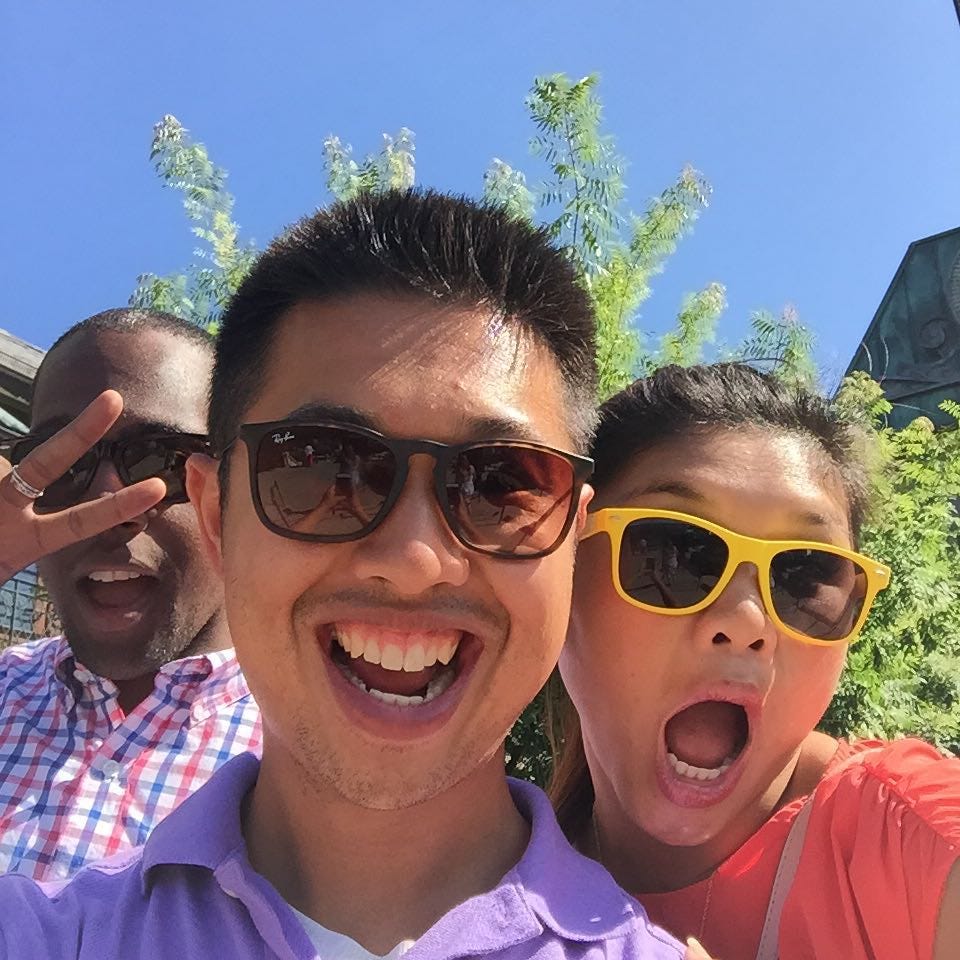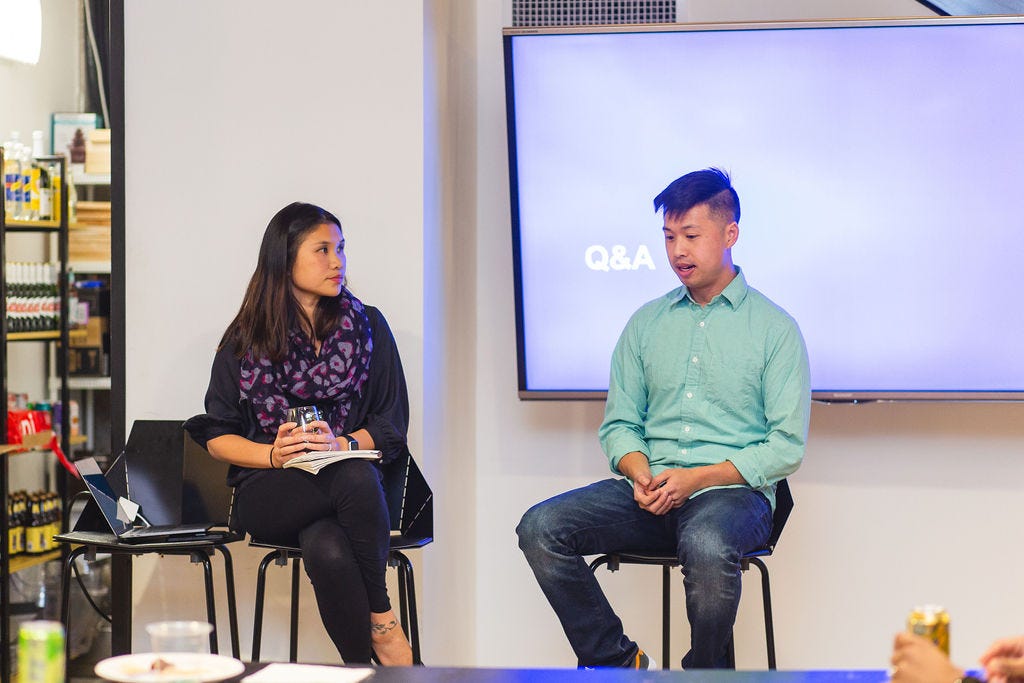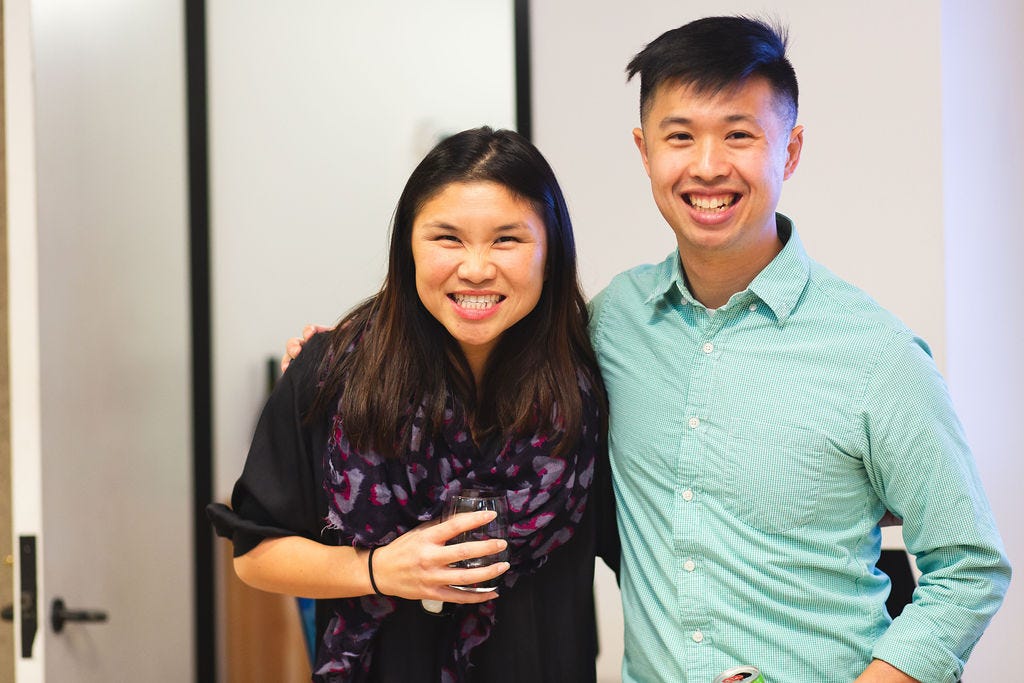Welcome to all the new subscribers who joined this week! I’m grateful you’re here. If you’re new, make sure to check out the back catalog of articles and send me a note (you can reply to this email to introduce yourself and to let me know what you’re working on and a goal you have for yourself this year!
January is National Mentoring Month, and I’m using this weekend as a time to reflect on the mentors that I've had in my life, and how they’ve played a critical role in helping me navigate life and work as well as my own work as a mentor to others.
When I first got to Boston College as an 18-year old freshman first-year student, I knew one thing. That I wanted to become a leader on campus. I had just graduated from high school where I was President of the Student Government and very involved in my community. I loved working on teams and rallying people together toward a common goal, and made it a mission to optimize for as many opportunities to work on teams and be in leadership roles in my time in college.
During my new student orientation, I met a First-Year Orientation Leader, Whitnie who was a senior on campus. She was loud, friendly and outgoing. We’d later get the chance to meet, working together when I was elected as a freshman rep in our student senate, and that is where I got to see her shine. While she seemingly was always coming into our meetings from another meeting where she was working on other important initiatives to help students and the school, she always found ways to contribute to what we were working on, seemed to know every single person, and had a blend of both knowing her shit but being incredibly human. When she didn’t know something, she just said so, and when she did, she was always willing to share. I would also find out that she was a mentor and friend to many, offering lots of counsel and guidance to other peers and younger students. From a distance, I admired her, and wanted to emulate parts of it on my own as I began to develop into a leader myself.
Whitnie graduated and went on her way to post-graduate life - while I went on my path to becoming the student leader that I was hoping to become, modeling myself off of Whitnie, and many of the other student leaders on campus who I admired and respected. I continued to get elected to serve in the Student Senate and took on many other leadership opportunities, ranging from leading retreats, student athletics, and serving eventually as Student Body President. While all of these were leadership roles, naturally led to accidental mentoring opportunities, where younger students would come to me for advice or counsel.
Being a mentor was a funny concept as a 20 or 21 year old. On one hand, the students coming to me for guidance were 18 or 19, and were asking me about things that I had already experienced. But, I was only a year or two older, and sometimes I really didn’t feel that empowered or wise to speak on such topics. I would learn this first hand during my junior year at BC when I was a Resident Assistant for freshman students. As a 20 year old, I was tasked with being responsible for a group of 18 year olds coming to college for the first time. On one hand, I had been through that experience, and knew the ups and downs, such as how to navigate a roommate situation or how to be self-sufficient as a young adult. On the other, I still wasn’t legally allowed to drink and was on my parents health insurance! That experience taught me the humility and grace of being a mentor - when I was outside of doing the traditional duties of being an RA, many of the residents would come to me to ask questions or get advice about situations they were dealing with. In some instances, I felt like I had a lot to say, but in others, I found myself asking more questions and probing for more details.It was through these experiences where I learned that being a mentor was also an incredibly valuable learning experience.
What was also unique, and helpful, was since I was in many other positions where I was mentoring others, those experiences were actually helping me in other ways. As an example, my experiences mentoring students in my capacity as an RA, was super helpful when I became a First-Year Orientation Leader, and in many cases ended up mentoring students who would come to me in their first year because they were struggling with adjusting to being away from home. Anyone who has ever mentored consistently can probably tell you that the experience being a mentor can sometimes be just as helpful and meaningful.
These experiences mentoring people close to me in age taught me something else - while having older and more seasoned mentors who have more lived experience is always helpful, you’re never too young to be able to share your own strengths, stories, and learnings, and to be a listening and encouraging ear to someone who is just starting off in their journey. Even as a 19 or 20 year old, I could see that I was having a positive impact on someone else by serving in a mentoring capacity, and was determined to continue doing so.
After finishing my first stint at Deloitte in 2013, I went to UNC to get my MBA. After navigating a challenging but meaningful first year of school, I got an email one day, and it was from Whitnie. She had just put down her deposit to UNC and was coming to Chapel Hill to be an MBA student in the following year. I was so excited to hear from her, but given how much I respected and looked up to her when I was a freshman at BC, I felt honored that she would reach out. I did my best to tell her everything I could. As any MBA student or Alum can tell you, the first year of business school is challenging. The best description is that it’s like “drinking from a firehose.” Knowing that, I tried to be supportive where I could to Whitnie as she navigated through her own transition in business school and adjusting to living in a new city. But through that time we became good friends and constant supporters of each other’s work, at UNC, and beyond. (You can read about her legacy at UNC here.)
Whitnie helping me acclimate to a new city when I moved to San Francisco
Whitnie and I actually both ended up in San Francisco after we graduated and while I continued to look at her as a mentor, she also became a friend, and someone that I admired and looked up to. Here are just a couple examples of how Whitnie has helped me as a mentor:
When I had questions about how to build community and a personal life in a new city and a demanding job, Whitnie was the person that I went to as I know she experienced similar challenges.
When I was starting to think more deeply about my own identity as a Chinese-American, and what that meant, Whitnie was someone I could talk to having had worked through similar questions herself.
When I was contemplating leaving consulting to work in tech, Whitnie was the one who helped me focus on what exactly I wanted to change and go to, and how to take some of the best parts with me from my time as a consultant.
And when it was time to write my book, and find a place to host a book launch party, Whitnie was the person I asked to interview me (and also host the place, thanks for the sweet venue!)
What Makes a Great Mentor?
I can think of numerous decisions that I have made over the past few things in my life where Whitnie, and our conversations have had an impact on decisions that I've made in my life. If I think about where she, and many of my other mentors were most helpful, it comes down to these key roles:
Judgment free listening - Sometimes you just need a safe space to talk about something to someone who A) can empathize with your specific situation and B) is not going to judge you for it. Mentors have provided this space for me, which has allowed me to open up and talk in an honest way about any challenges or concerns.
Thought Partner - This is where Whitnie and others have been great - for me, having someone who can listen, ask thoughtful questions, and encourage me to think deeply is so helpful and empowering as I worked through challenges or decisions in my life and career.
Sharing lived experiences - Probably the most common reason to turn to a mentor is because they have already lived through the experiences I was going through. In this case, Whitnie not only had a few more years worth of life experience (not too far away) but she also experienced many of the things or opportunities that I had, and was great at sharing her specific experiences and reflections upon them in a way that was helpful for me to “see around the corners.”
Encouraging action - I have a tendency to analyze and think through everything, and mentoring conversations were great data points me to analyze and synthesize. Whitnie and others were great at recognizing this, and nudging me to take specific actions so I could go out and get further feedback and make further progress
The MBA Insider Book Launch Party, courtesy of Whitnie
As the host of the MBA Insider Podcast and the Product Marketing Careers podcast, I get the privilege of talking to talented entrepreneurs, managers, leaders and other leadership experts all who are at the top of their game, such as people like Whitnie. It’s hard not to have a conversation with any of these individuals without the topic of mentors and the role that they play come up, either when we talk about a pivotal moment, uncovering a strength or insight about themselves, or finding an opportunity that was initially unseen, or giving them tough but honest advice that encourages action even in difficult situations. It’s clear that when we look at successful individuals, we can see their talents and skills, but underneath or behind that, is a mentor, or series of mentors who are serving as coaches, guides and support systems along the way.
I often like to say that careers are a team sport, and not an individual one (think football or basketball, not golf.) We all exist in a world that is much bigger than ourselves, and while all of us are talented, we can’t always see our own genius and can be blinded by our biases and perspective (this is why I believe giving feedback to others proactively about their talents is so important) Having Whitnie, and a number of other mentors on speed dial over the years has given me the confidence to navigate decisions, work through my insecurities and doubts, and go down paths that I couldn’t always see clearly, but with some guidance and support gained the confidence to keep learning, growing and developing into a better version of my self.
I’m grateful for people like Whitnie that I have in my life, because they’ve helped me see beyond things that I couldn’t, and knew how to encourage me to continue leaning into all the aspects of me that I know exist but don’t always have the confidence to use. I am equally as grateful, for serving as a mentor, formally and informally to numerous students and professionals over the years. Whether it was mentoring college students as an Resident Assistant or student leader, helping out new hire analysts coming into the firm at Deloitte, or serving as a mentor through formal mentorship programs like First Round’s Mentorship Program, these experiences have allowed me to broaden my own perspective, become a better listener and coach, and brought relationships and connections into my own life that I wouldn’t have otherwise.
Note: if you’re looking to do more mentoring especially for emerging talent in the tech+startup ecosystem, make sure to sign up for First Round Capital’s Fast Track Mentorship Program. it’s a great way to become a mentor give back, and help unlock the potential of tech’s next wave of talent! I’m registered and you can sign up here!
For Mentors
If you are a mentor currently, or hope to do more of this, here’s some tips
A little practice helps - Most people want to jump in and share their knowledge and wisdom right away in a 1:1 setting. While that intention is great, consider taking training or getting some guidance first on what good mentorship looks like. Fortunately, Whitnie has actually put together a great guide, so that’s a great starting point.
Find the lane that works for you - One question I often get is “I want to give back but I don’t know where to do it.” There are lots of different approaches to this. One could be through a formal program such as First Round Fast Track, but ultimately, you should find what works best for you, your aspirations, and where you show up best. One creative way I have seen this is through my friends Shyvee, Felix, and Diego, who are passionate about helping students break into product management. They’ve leveraged their knowledge of Product Management and used platforms like LinkedIn, YouTube, Substack and others to mentor people in a scalable way.
Understand your role and acknowledge your limitations- Sharing your own knowledge and experiences as a mentor is a helpful thing to do. However, it's important to acknowledge that the role you play doesn’t always mean you need to tell the person exactly what to do, or force change upon someone else. Ultimately, your mentee needs to drive their own learning and growth, and you certainly play a role in facilitating that. Additionally, It’s easy for our biases to creep into the mentoring relationships we have with our mentors. Yes, please share your wisdom, but just be mindful of how to best articulate and share it with your mentees.
Look for underserved populations - Many of the opportunities that come our way in careers happen in rooms we are not in from people we don not know. This is also why its super critical to support mentoring programs that focus on underserved or underrepresented populations. One organization doing this is Kristina Hu’s Kristina Hu’s The Equity Network but there are many others out there. One of my favorite’s is Year Up
For People Seeking Mentorship
If you’re looking for a mentor, here’s some advice
Go where your people are - Odds are, if you’re looking for a mentor on something, whatever it is that you're looking to do already has people who have done it before or are doing it before. Trying to find the community of people who share that interest, title, role, etc is a great first step. For example, if you were trying to break into product management, checking out Felix’s community would be a great first step.
Find ways to share your work - One way to find an excuse to meet people and build relationships is by sharing your work or things that you produce or create. If you’re a writer, that could be an article and asking other writers for feedback, or if you’re a designer perhaps it's a new mock up you’ve created. Finding places to ask for feedback whether its on platforms like LinkedIn or Twitter, or through more formal organizations is a built in mechanism to find other people you can learn with and learn from
Follow your curiosity - I have had the most success with developing mentoring relationships where there was a shared interest in something we were both generally interested in and curious about. Finding a topic, idea, or thing that you are genuinely interested in often is the best first step to finding a mentor who also shares that topic and general interest.
Look for commonalities and shared interests - We intuitively know that finding shared interests is always a good approach to building relationships period. For example, when I was a kid and was new to my school, the first set of friends I made were all interested in basketball, just like me. Whitnie and I had shared interests in terms of our love for Boston College, developing others, and caring deeply about our careers and friends, but for you, it might be something else. If you work in a large organization or company, a great way to find this is through your Employee Resource Groups, but even if you don’t, there are many organizations online or in your community where you can find other people who care about the same things that you do. (Ex: MeetUp, Ladders, Teal)
Happy Mentorship Month!
Thanks to Whitnie, and to all the other mentors that are out there doing great work in helping people navigate their careers and life.
Mentoring allows us to share our gifts and talents with others, which is why I encourage others to do it regularly. However, it also gives us a gift to do something that others around us can sincerely appreciate - to listen and be a sounding board, free of judgment, and full of trust.
If you are looking for guidance on how to find a mentor or how to be a better mentor, please check out the resources below
Further Reading, Listening and Resources on Mentorship
Article: The Difference Between Mentors and Sponsors (Korn Ferry)
Article: How People Can Open Doors For You (The Muse)
Defining The Practice of Mentorship (Mentor Spaces)
Here is What Makes Mentorship Work (First Round)
Podcast: Networking Mentoring and Building Relationships - Whitnie Narcisse
Have you had a great mentor? Do you have a great mentee? I’d love to hear about it - send me a note and let me know how mentorship has positively impacted your life and career
Have a great week!
Al








Al, really nice article and thanks for all the resources! I am currently mid-level in my career and while I am mentoring others more junior, I find it harder to get mentorship from more senior positions like director/VP level. Do you have a perspective on that?